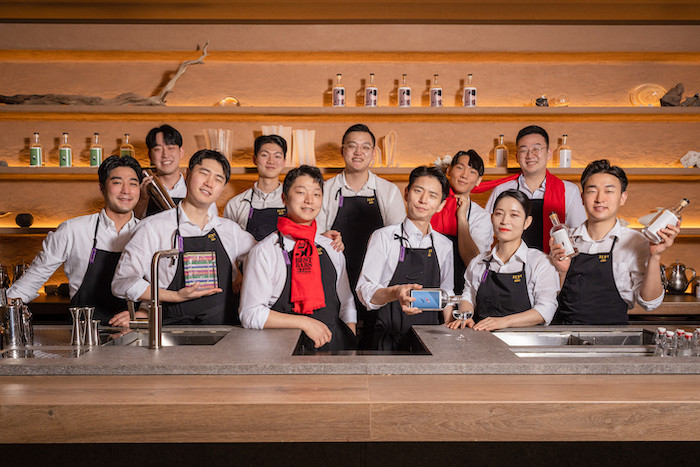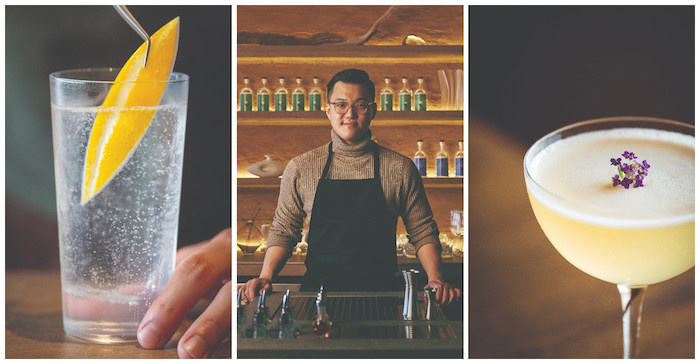
South Korean bar Zest has quickly built an international reputation, debuting in The World’s 50 Best Bars in October. Hamish Smith learns all about the bar from its co-founder, Demie Kim.
Zest has built a name for itself as a showcase of South Korean ingredients – tell us about the bar
I’m a co-founder of Zest which opened in December 2020 with partners Sean Woo, Jisu Park and Noah Kwon. We wanted to open a bar that is unique – one that you couldn’t experience anywhere else that showcases a Korean interpretation of a cocktail bar to the world. Our drinks are built around local products from local producers, and through this we have built a community of producers, drinks makers and customers. Out of a respect for these ingredients and the integrity by which they are made, we also aim to minimise waste to as close as we can to zero. In fact, Zest is a portmanteau of zero and waste – as well as being one of the many by-products of citrus.
By working to sustainable goals, partnering with urban farms and foraging for ingredients yourselves you’ve gone against traditional supply routes – what’s the reaction been?
We had lots of fear opening a localised, zero-waste bar. But sustainability has become a global movement and Korea is following. Now our brands, producers and consumers are supportive of our approach. By taking more of a role in the sourcing of ingredients, we’re able to add value to our drinks. Take the humble Mojito – when the mint is handpicked from one of our partner farms the day the cocktail is served, it tastes much better. The story you tell to the customer is better too. This element of control we have over our ingredients not only means we are using the best quality ingredients at their freshest, we reduce packaging waste too.
Can you give us a flavour of the Korean ingredients you use that we may not be familiar with?
One of most unfamiliar ingredients we use is sikhye, a Korean rice beverage, served as dessert and made with cooked rice, malted barley and spices such as ginger and cinnamon. There are many variations, but currently we are using pumpkin sikhye. As a Korean bar, of course, many of our cocktails showcase local sojus from small distilleries. Jinmaek Soju is one example. From a village called Andong, there is a farm to bottle ethos – they crop the wheat by hand, distill and bottle all themselves, which exactly matches our philosophy.
How do you go about developing cocktails and incorporating your anti-waste ethos?
Our ideas often come as we pause in front of the trash can. It’s at that moment that we often realise what we do with would-be waste – it’s how many of our cocktails are built. For example, once we have juiced the hallabong (Jeju orange) for our Jeju Garibaldi (all of the ingredients of which are from Jeju Island), we use the peel to make our Garibaldi powder which goes into the Custard Sour. The pulp left over is made into a pickle for our Martini cocktail called Oh My Gibson. So three cocktails from one hallabong fruit. Our menu does a lot of this – we ingredient share across multiple cocktails and food.

Tell us about your back bar
We don’t have branded bottles on the back bar. We want people to enjoy the ambiance without any visual disturbance so we don’t display any unnecessary elements. Be it drinks, design or materials, we try to apply the same philosophy. So we display our own spirits – for example we have our four seasonal gins made with fruits and herbs from our farm. We also want customers to judge our cocktails by their taste, not the spirit brand we use.
Can you give a few examples of drinks that best represent your approach?
We make all carbonated drinks ourselves. We make our own soda, tonic water, ginger beer, and even cola with upcycled ingredients that would have been thrown away. All sodas are carbonated by our house soda system. So we don’t produce any aluminium can or plastic waste.
The best example of our house soda system would be our Gin & Tonic, which we call Z&T (Zest & Tonic). We distill our own gin with seasonal fruits (prioritising ugly, less desirable fruits) and botanicals that we handpick from our farm near Seoul. Combined with house tonic water, and carbonated with our house soda system, we created a Seasonal Gin Tonic with as minimal waste as possible.
City Bee’s Knees is a tribute to bees, nature’s elite pollinators. Since 2010, nearly 90% of domestic bees have disappeared in Korea, so we’re collaborating with these urban beekeepers who are bringing a positive ecological change to the city. When there are more bees in the city, it will increase the flower blossom rate, which will attract more insects, and in turn small birds to the city. So, it’s a great positive chain reaction to the city ecosystem.
The cocktail is made with gin, ‘secondflush citrus’ from leftover citrus husks and honey which is sourced directly from Seoul beekeepers. Imagine, just drinking one cocktail makes the city greener.


